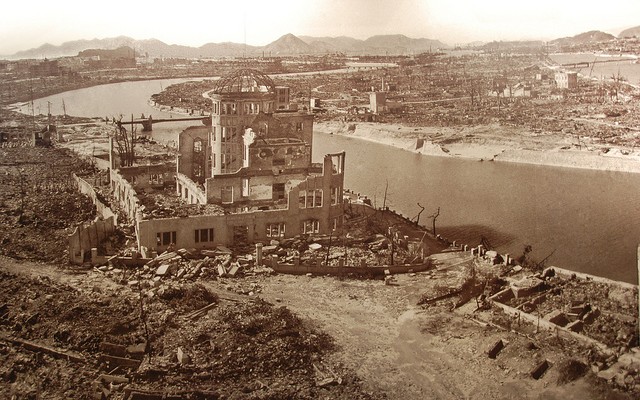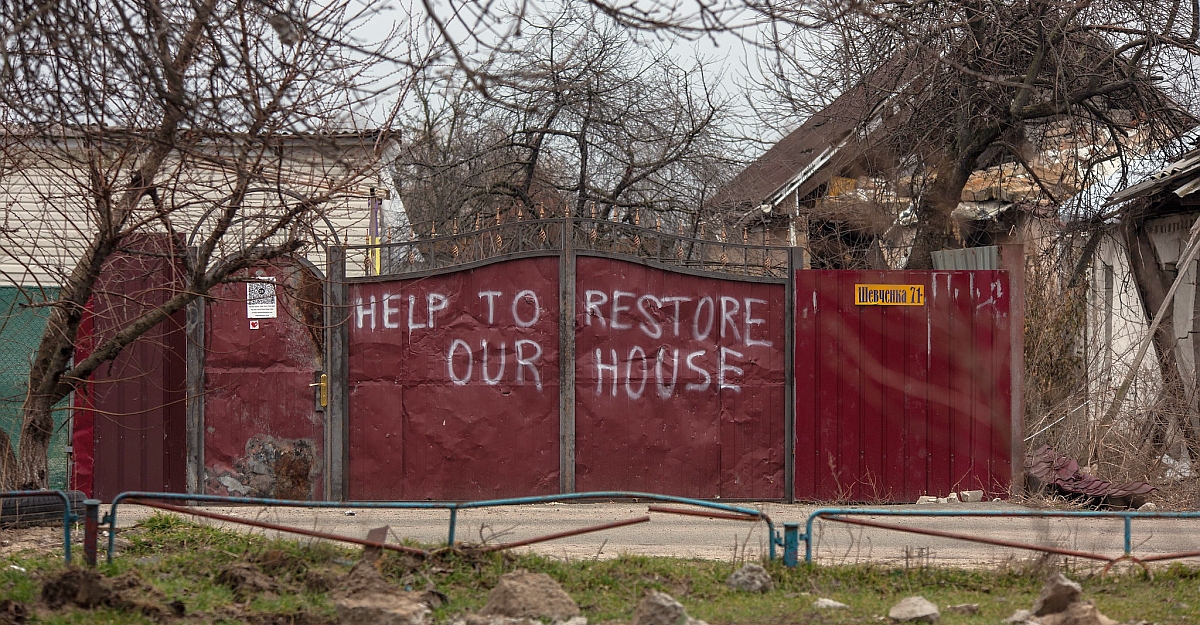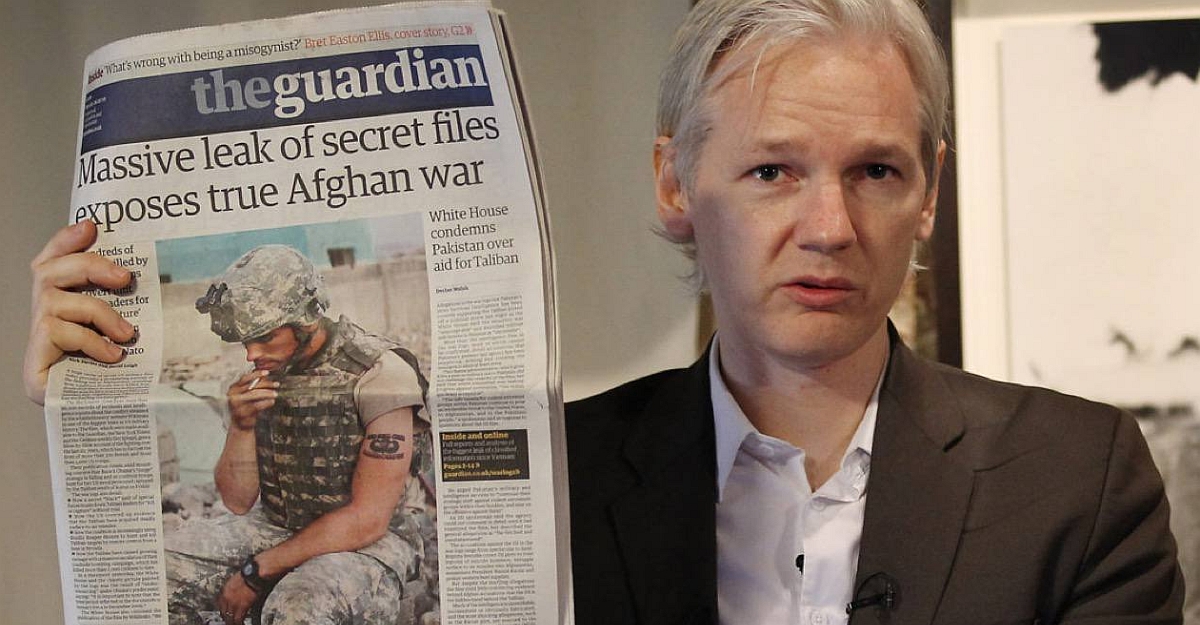Ota Yoko (1903–1963) was the only prominent novelist to survive the bombing of Hiroshima. After it, she wrote only essays and fictional stories, which documented the experiences of victims, carving out the field of atomic literature in which she is renowned. Her obsessive dedication to realistically relating what happened was driven by her conviction that she was the only one left to do so. Burdened by survivor responsibility, she wrote on tranquilisers to dull the visceral trauma triggered by remembering, and struggled to find the right words, saying new vocabulary was needed to render ‘the reality of Hiroshima’.
‘Like light on the sea floor’ appeared in national Japanese newspaper The Yomiuri Shimbun in late August 1945, making it the first long-form biographical account of the bomb ever published. Though prolific, her work wasn’t available in English until 1990, starting with her novel City of Corpses (a large excerpt of which was released in a new translation this year).
Like light on the sea floor
Written by Ota Yoko
Translated from Japanese by Marissa Skeels
Bell crickets and pine crickets call in the summer grass surrounding the house. Inside the pale blue mosquito net, my older sister’s dear little baby sleeps soundly. Bruises fading to lilac still mar its cheeks and legs, but are healing faster than anyone else’s. Beside her lies my 25-year-old sister, facing her, snoring quietly. Her whole face is still pitifully pocked with scabbed blood. Her wounds smell. Their scent is unlike that of blood and pus from normal injuries. This odour is like that of toxins. I showed symptoms of cancer myself, so was staying in a surgery department until the other day. Amid the many who came to die there, that fetid stench pierced my bones.
Our mother sleeps next to my sister. She, luckily, has no injury to her blood. There is no pen, paper, nor ink here. The sounds of insects reverberate while the gash from my left ear to my neck aches in the late hours of the night, where I sit at a small, borrowed table. When I open my eyes, I see faint lights gleaming in the village alongside spot-fires raging out of control. This demonic air raid struck every house. I suspect the wounded are laid out in every one.
Since it happened, eroding Hiroshima with flames, blinking the city into nothingness, I have turned militant. Since the 6th, I’ve thought that, surely, this war has to go on. I was getting my injuries treated at my father’s doctor friend’s house when I heard it said that the bomb was just another step in the battle. I crouched on the floor, hands pressed against my stomach, a tear running down my cheek, but the awful suddenness of that was nothing next to the shock wrought by the bomb. Just after 8 am on the 6th, unexpected, eerie rays of light in the summer morning air were indelibly imprinted on all who greeted the day in Hiroshima.
I was at my mother and older sister’s home in Hakushima Kukencho. I’d come back from Tokyo, chasing somewhere more rural, and what had been intended to be a direct trip was broken by my being waylaid, hospitalized. On the 5th, I’d been out of hospital for 10 days. All through that night, air raid squads filled the skies of Yamaguchi prefecture. At dawn, when the warning sirens finally ceased, we slipped into our beds.
I was tired. I suppose I must have fallen into a deep sleep. At the moment it occurred to me that I was having was an unfamiliar, strange dream, beaming celadon light the colour of light on the sea floor bathed the outside of my eyelids, which didn’t form part of the dream nor waking life. Just as I thought this really was a strange dream, an intense sound occurred which is difficult to put into words, and I felt my body being flung about, with the sensation it was being smashed to tiny pieces. There was no boom of a bomb hitting the ground, nor was there the sound of incendiary bombs, which echoes falling rain. There was a k-chiiin: the reverberation of resistance, of metal. The only term that captures it is ‘a moment’, though it was unlike any moment I’d ever experienced before. Even so, I thought that maybe 20 or 30 incendiary bombs had fallen right above my bed, and I scanned the room, trying to find them.
But there was no fire. I’d been blown away like leaves off a tree, but I was still in the 10 tatami-mat room where I’d slept, and still wearing my kimono. I saw clearly the dark red, pongee splash pattern of its fabric, but everything else – the bed and mosquito net, the fitted coat and hooded cap by the bedside, my obi sash and tengui handcloth – was gone. For a long moment, billowing dust from the missing clay walls covered my eyes and filled my nose and mouth, and I coughed violently. The house’s roof, walls, and windows had been blown away, and although it was standing, it was distorted, as if snapped at its waist. Looking out at the neighbourhood, which should have been hidden from view, I had the impression I was standing alone in a wild field. I shouldn’t have been able to see the neighbouring house’s front gate, but there it was, and upon seeing me I heard the young housewife living there cry out ‘Ah.’
Our house, which had narrowly escaped collapsing, could fall at any time. I needed to get down from the second floor, and soon. Both ends of the staircase were fortunately intact, but were strewn with my clothes, large trees, glass, and planks, so it wasn’t a viable path. No sooner had I called out to the housewife at her gate to go and get someone from hers to help did my little sister appear at the foot of the stairs, covered with blood from head to toe. It flowed down her white clothes, dripping off their hems.
‘Is Mom alive?’ I asked.
‘I’ve been calling out to her, but there’s no answer. You’re not as hurt as me. Find a way down.’
Fresh blood poured from my ear, warming my neck. Keeping one eye on the room behind me, I made it past the holes everywhere by moving in a sort of crawl.
We left the house via the rear garden, walking along a back road, meeting other survivors. As far as the eye could see, every house was flattened. In the time it took to utter ‘Oh’, the blast wave from the bomb, with its blue light and noise and roaring wind, felled almost the whole city.
Many of us from around there gathered in the cemetery in the formerly verdant forest. Blood trickled down faces and limbs. To our left, two girls kept shouting into the wreckage of a destroyed house, ‘Mom, mom, hurry up and come with us! There’s a fire, you’ll be burned to death while you’re looking for things to save. Hurry up, hurry!’
For the rest of the day, the residents of our neighbourhood at the downstream end of the Ota River – which had always been especially beautiful, in the morning and at twilight –spread from the banks of the river out onto the dry riverbed to stay beyond the reach of blanketing fires. All day, the noise of explosions, flames kindled by the bombs, as well as enormous rags and planks were hurled by the wind at people’s heads. The sky turned dark at noon, and the sun, a crimson fireball, drifted down through black clouds.
The reality before us on the 7th and 8th was like a picture scroll of another world. I don’t want to think of it as gruesome. The three short days we spent awake crouching on the river bed like beggars, we harmonised. Our feelings of acceptance of the peril we faced, and our endurance and genuine comradery proved our souls were more noble than those of any who are born grand. We lay alongside corpses. We witnessed the limits of what one can take, without fear. While countless people packed together, no one cried or spoke of their feelings alone. We Japanese are not very flexible, but for those three days on the dry river bed where people came to die, we saw clearly the reserved calm we evince when normality is gone.
On top of the hot sand stretching toward the narrow, clean water of the outgoing tide, people sitting here and there would lie down and not move again. There was no one area where one could stay for long, yet nowhere was there was a hint of chaos sparking. We heard tell that the horrific burns of those who came to die, burned into them by that lightning flash, had paralysed their nerves so they couldn’t feel any stinging pain. Even more than the sight of their gently lying down to die, their hushed silence affected us deeply. A 15- or 16-year-old working student drank water, stuffed his cheeks with the last of the rice balls that were handed out, gave his name clearly, and passed away. The body of a five-year-old girl was stretched out on the riverbank beneath the sun, as if she were asleep.
On the 7th, a rescue team came to treat us. We heard that the air raid the day before had been an uncommon one, where a new weapon was used for the first time. From that night through to noon on the 8th, people began to make noise; they started falling. Overnight, all night, a young girl was heard shouting in a pretty Tokyo accent, ‘It’s okay, Father, it’s okay, Mother. Welcome home, let’s have fun.’
‘She’s lost her mind,’ we said, and tears started to flow. The crying spread.
The brutality of the new weapon is undeniable, but my thoughts then were that it wasn’t something which could raze our spirits like it had the city, and the act of one side using it because they wanted to war to hurry up and end was a disgrace.
Germany has been defeated. It is impossible to respect the new weapon, same as it is impossible to scorn Germany. Though Hiroshima’s scarring is vast and deep, if the sight of it is deplorable, then it is the shame of those who inflicted it. Hiroshima bears no shame. I want to think that. I want to think instead that the war is punctuated by the strength of the city’s victims.
Since the night of 9th, we have been staying for the time being in a house in the grassy foothills of western Honshu’s mountains. This village is calm, with an undercurrent of agitation. I sleep on the dewy grass of its river bed, my face still pale. Rather than focusing on my pain during the nights, I am fixed on the significance of my mind, having seen what I have.
海底のような光 (原子爆弾の空襲に遭って)大田 洋子
家のまわりの夏華のなかで、鈴虫や松虫が鳴いている。薄みどりの蚊帳のうちでは、姉絵の赤ん坊が可愛い姿でよく眠っている。赤ん坊の頬と足の傷は、打撲傷で、うす紫のあざになってのこっていたが誰の傷よりも早くなおった。傍に二十五歳になる私の姉が、赤ん坊の方を向いて軽いいびきを立てている。顔中の傷あとに血のかさぶたが残って痛ましい。姉の傷はくさい。普通の怪我の血と膿のせいだけでなく、毒素の臭いを感じる。私はさきごろまで病院の外科に入院していて、癌を見せてもらったけれど、あの悪性の臭気を、今度はおびただしく死んで行く人々の間で骨身を刺すほどにかいだ。
姉の隣りに母が眠っている。母は倖せにも血の負傷はしなかった。ペンも紙もインクもない。借物の小卓の前で、夜ふけの虫の音を聞いていると、左耳から耳の下にかけて切り裂いた傷が痛む。眼をあけると火管制のなくなった村のあちこちに、淡い灯が見える。その家々には今度の悪魔のような空襲にあって怪我をした人たちが横たわっているのであろう。
広島市が一瞬の間にかき消え燃えただれて無に落ちた時から私は好戦的になった。かならずしもすきでなかった戦争を、六日のあの日から、どうしても続けなくてはならないと思った。やめてはならねと思った。戦いの推移を、父の友人の医者の家で、傷の手当をうけながらきいた。私は両手でお腹を抑え床にしゃがみ込んで、ぼろと涙を流した。あの劇烈な原子爆弾からうけた衝動にくらぶべくもないほどの劇しい驚きであった。六日の朝の八時すぎ、広島市で朝をむかえたほどおひとびととは、あの夏の朝の思いがけね無気味な光線の色を未来永劫に忘れことはないにちがいない。私は母や姉の住んでいる白島九軒町の家にいた。今年の一月、東京から、からだ一つでかえって来て、もっと田舎へいるつもりが入院などでおくれていた。退院して十一日であった。前の夜、山口県の宇部が一晩中空襲された。朝になって警戒警報もとれたので、寝床にもぐりこんだ。
疲れ切っていて、とてもよく眼ったようだった。見馴れない珍しくふしぎな夢を見たと思った刹那、緑青色の海の底みたいな光線が瞼の上を夢ともうつつともなく流れた。へんな夢を見たと思った瞬間、名状し難い強烈な音が起って、私はからだが粉々に砕け飛び散ったような衝動をうけた。爆弾の地に落ちこむダダンという音でもなく、ザザッと雨のようだという爆夷弾がこのの音ともちがい、カ千インという金属的な、抵抗しがたい音響だった。一瞬という言葉がこの朝ほど身をもって適切っに感じられたことはかつてない。それでも私は二十個も三十個もの爆夷弾が寝床のうえに降りかかったのだと思い、きょろきょろとそれを探した。
それにしても火が見えない。私は木の葉のように吹きとばされたようだったけれど、前夜から寝ていた十畳の座敷に、絣の着物を来て立っていた。つむぎの絣のえんじの色がはっきり見えたが、そのほかの一切のもの、寝床も蚊帳も、枕元にあった防空服も頭巾も、帯も手拭も何も見えない。もうもうと立ちこめた壁土の煙で耳も眼も口もおおわれて、私は咳をしきりにした。家は屋根も壁も窓もふきとび、腰をねじった形でやっと骨がらみのまま立っているだけである。野っ原に私はただ一人立っている感じで、見えるはずのない隣り近所がまる見えだった。見えないはずの前のお宅の門だけが見え、ぺシャンコの家の前から若いお嬢さんが、私を見てアッといったのをきいた。やっと倒壊をまぬがれている家はいつ倒れるかわからない。
私は二階を早く降りなくてはならない。裏と表両方についている階段はのこっているけれど、私の身丈よりも高く木や硝子や板でふさがって降りることは出来そうになかった。門の見えるお宅のお嫁さんに頼んで家の者を呼んでもらうと妹があがって来た。階段をあがって来た妹は顔から全身血まみれになり、白い洋服にぽたぽたと血の滴が流れ落ちていた。「お母さんは生きているの」「ええさっきからお母さんがあんなに呼んでるのに聞こえないの。お姉さんは私より傷が軽いわ。どうかして降りてちょうだい」左の耳から頬に流れる血汐があたたかく首の上に落ちて来る。やっとのがれ出る穴をつくって這うように座敷から出るとき、別れの眼を今一度部屋に向けた。
私どもは裏庭を隔てた裏地で生きている顔を合わせた。見渡す限りの家がいちどきに倒れている。青い光と音響と強風のような爆風とは全市をおおい、アッといった間に殆どすべては崩れ倒れていたのである。美しかった森の墓地には近所の方の誰彼が顔や手足に血をしたたらせて集まって来た。そしてぺシャンコにこわれた右隣りの二人のお嬢さんがひっきりなしに叫びつづける。「お母さん、お母さん、早く逃げましょう!火事ですよ、慾ばって物を探しているうちに焼け死ぬんですよ。早く、早く」
朝や黄昏など、特に風景の美しかった大田川の下流、私どもの住んでいた町の土手から降りて行く河原に火事をさけてすごした六日、そして七日と八日、その間に見た現実は、この世のほかの絵巻であった。私はそれを凄惨だったとは思いたくない。危険と忍耐と、純粋な民族感への満ち足りた感情との三日間乞食のように河原に起き伏した短い日、私たちはどんな貴族よりも高い精神のなかに呼吸していた。死骸と並んで寝ることも怖れぬ忍耐の限度を見た。おびただしい人の群れのだれも泣かない。誰も自己の感情を語らない。日本人は敏捷ではないが、極度につつましく真面目だということを、死んで行く人の多い河原はの三日間でまざまざと見た。
河原は引潮で細い清らかな水の流れの外は白い熱砂であった。そのうえに点々と人が坐り、寝ころび、佇んでいた。六日は一日じゅう爆発の音がとどろき火のついた大きい襤褸切れや板っぱしが強風に吹きあげられて頭のうえにふりかかった。空は昼なお昏く、黒い雲のなかを真紅の太陽の火玉がどんどん落ちて来た。
河原でも一つ所に長く止まることはできなかった。けれども阿鼻叫喚の気配はどこにもないのだ。だまって静かに死んで行く人達、電光で焼いたひどい火傷は神経が麻痺して、ひりひりする劇痛は感じないとか聞くけれど、それにしても負傷者の寂として静かなことは一層心をうつのである。水をのみ、配給の握り飯を最後に頬ばってはっきりと名を告げて息を引きとった十五、六歳の勤労学徒もあった。河原の陽の下に、寝そべったように死んでいる五歳位の女の子もいた。
七日になって河原に来た救護班の手当をうけた。この日になって昨日の異様な空襲が、新兵器のはじめての使用であったことをきいた。七日の夜から八日の朝、また昼にかけて、人々はばたばたと倒れた。七日の夜は朝まできれいな東京の言葉で「お父さまア、お母さまア、いいのよウ、いいのよウ。おかえりあそばせエー」と絶叫しつづける若い娘の声が聞えた。「気がちがったのね」私たちは涙を流しとおした。
新兵器の残忍性を否定することは出来ない。だが私は精神は兵器によって焼き払う術もないと思った。あの爆弾は戦争を早く止めたい故に、使った側の恥辱である。ドイツが敗北した。ドイツを軽蔑できなかったと同じに、あの新型爆弾というものを尊敬することはできない。広島市の被害は結果的に深く大きいけれど、もしその情景が醜悪だったならば、それは相手方の醜悪さである。広島市は醜悪ではなかった。むしろ犠牲者の美しさで、戦争の終局を飾ったものと思いたい。
草深い中国山脈の下の田舎の家に、仮りの宿をとったのが、九日の夜からだった。村は冷静でもある。興奮してもいる。私は蒼白な顔のまま、河原の露草にねて、傷の痛みに夜を徹した時よりも、きのうきょうの心の重さを見つめている。
(広島にて)
###
Translator’s note
‘Like light on the sea floor’ was written by reporter and novelist Ota Yoko a week or so after Hiroshima was bombed. After the war, she was unable to write about anything but the experience. The few other notable professional writers who survived the bombing, poets Hara Tamiki and Toge Sankichi, were nearly all dead within years, while Ota lived on. She is reported to have written on tranquilisers to dull the visceral trauma of having to remember, and lamented the burden of her responsibility to keep writing, saying, ‘Who else could you find?’
This essay, her first on the bomb (and the first autobiographical account of it ever published, in a Japanese national newspaper) is rather muted by her standards, and by ours. Its descriptions are not as starkly graphic as we are accustomed to reading in stories about the bombings. In fact, Ota’s works became steadily more graphic, more immediate, and rawer as years passed. Their portrayals of alienation and demands for accountability led to her falling out of favour for a period in literary circles. Not only was she stubborn – decrying Hara’s suicide as an unforgivable betrayal; sending away US GIs who sought to bully her into complying with censorship; being cold to an American journalist who came bearing cultural bias to interview her – she did not fit the feel-good narrative which had developed wherein people were eventually ‘bettered’ by horrific wartime experiences. Japan was urging itself to focus on moving on, yet Ota was a persistent voice of grief. Her refusal to be silenced, in a period where society already weakened by imperial fascism was being refashioned with class-conflict-based and US-imported conservatism, defined and tarred her.
Neither Hara’s nor Toge’s works were ever dismissed for being too ‘angry’ or for ‘purple prose’. They were men, and their contributions to the burgeoning field of atomic literature were limited by the fact they were soon gone. The conspicuousness of their absence further haunted Ota.
From the 1960s onward, autobiographically influenced stories by women writers, including Nagasaki bomb survivors Takenishi Hiroko and Hayashi Kyoko, and Hiroshima poet Kurihara Sadako, proliferated. Softened by more feminine and optimistic expression, as well as by time, their styles and receptions were unlike Ota’s. Since her death, however, praise for her eloquence has been restored, even as Hiroshima authorities came to call for global peace and remembrance rather than for accountability.
Now, while survivors of the Hiroshima and Nagasaki atrocities dwindle in number, we have hundreds of meticulously documented firsthand and fictional accounts of the bombings to read. The abstract notion that modern bombs are hundreds of times more powerful than those which obliterated both cities, and the unlikelihood of their use in the course of war, situates the concept of nuclear war far from us. Yet interminable conflicts plague society and consciousness, and our well-exercised habit of growing inured to endless tales of grief plays out. It’s hard to keep up with traumas that are unfolding let alone those in the past which, though painstakingly documented, lose their relevance as they lose their immediacy. Still, fleeting moments continue to shape individuals and social progress. They pervade future generations like radiation.
This essay shows the first sprouts of Ota’s grief-stricken rage, which grew both great and gnarled with time, and which we live to inherit. Amid all the glimpses of stoicism which characterise survivors, including those accounts written and lived by Ota, it’s important that her anger too be witnessed and not forgotten.
Image: Hiroshima after the bomb (6 August 1945, 8.15 am)







